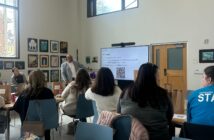Lehigh’s increase in social media use has found its way to becoming a learning tool used by professors, as well as a component in future job opportunities.
Social media sites like Twitter enable students who feel nervous about talking in class to express their opinions, ask questions or contribute to the discussion surrounding class topics. It also helps foster conversation with the professor on a one-to-one basis.
“I think in class — large and small — you are going to have classes with distribution of kids that are talkative and some that just don’t like to talk very much,” said Jeremy Littau, an assistant professor of journalism and communication, “They are nervous or quiet people. I use the hashtags in my classrooms to allow them to participate in another way.”
Silagh White, the director of arts engagement and community relations, said she believes social media helps with communications among her students. She encourages her students to try and develop interpersonal communications with others outside of class.
The first step in getting these newer ways of expression to the classroom is getting the professors on board, often with the creation of social media profiles.
“As more professors have embraced the idea of being a public intellectual — somebody whose research and scholarship and teaching are known within the university and outside the university — they’ve kind of embraced the medium as a way to kind of get their thoughts and ideas and their selves out there,” Littau said.
Social media’s entrance into the classroom has helped students continually connect with in- and out-of-the-classroom material. This also gives professors an opportunity to relate to them on another level, away from the confines of a classroom setting.
“I think they are a natural extension of the classroom,” Littau said. “Once a professor is engaged on Twitter, the more time they spend with it, they see avenues by which they can bring (it) into the classroom.”
Littau uses social media in several ways for his classes. He uses it to share relevant information and examples that are being taught in class, as well as check in on class participation. He also actually teaches students how to present themselves professionally and effectively online, with Twitter and other social pages as the platforms.
Some professors use it as a place to stay connected with other professors and their work.
“Since many professors have incredibly busy schedules, I can stay in touch with their research projects, conference presentations or other professional achievements, as well as connecting on a more social level,” White said.
The importance of learning how to use social media goes beyond just assisting in a classroom setting. It becomes an extension of the workplace as well. White says it helps facilitate relationships she has off of campus.
Social media’s benefits are not limited to an Arts and Sciences-based discipline, either. Littau said he’s had business students share with him the application of social media skills in their own workplaces.
“From a business perspective, what is the power of using social media? To reach potential customers,” said Georgette Phillips, the dean of the College of Business and Economics.
Phillips said social media is used in marketing, when businesses engage with customers and attempt to expand their bases. Social media data analytics can also contribute to these goals, as Facebook and other social media outlets can display advertisements they know will interest particular customers.
Even Lehigh admissions sees the value in recruiting students who are adept in social media. One of the university’s application essays for admission is “Imagine you just completed your visit to Lehigh University. What would you tweet about us and why?”






Comment policy
Comments posted to The Brown and White website are reviewed by a moderator before being approved. Incendiary speech or harassing language, including comments targeted at individuals, may be deemed unacceptable and not published. Spam and other soliciting will also be declined.
The Brown and White also reserves the right to not publish entirely anonymous comments.